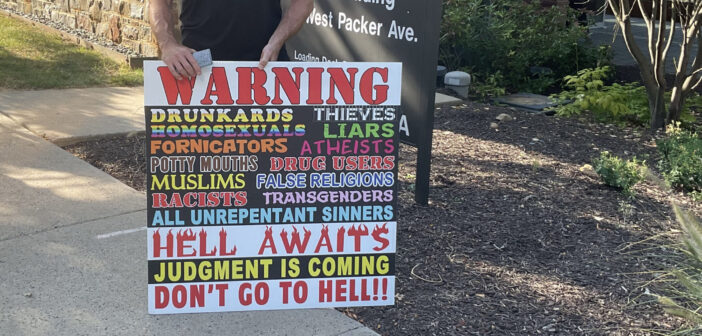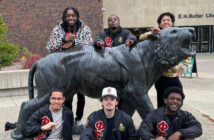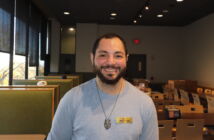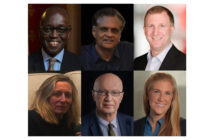After living in southern Georgia for six years, I experienced various forms of bigotry towards my identities which motivated me to apply to mainly out-of-state colleges with an emphasis on diversity and inclusion.
I accepted my offer at Lehigh in hopes of finding a safe space and community — something I never felt in Georgia. In my first two years, I found a support system through friendships, cultural organizations and offices like the Pride Center.
Lehigh started to feel like the safe space I had been looking for.
But on Thursday, Sept. 12, as I was leaving Fairchild-Martindale Library to head back to my dorm on my regular route, I saw a man holding up a sign on the sidewalk in front of the STEPS Building. I immediately stopped in my tracks.
The front of the sign read, “WARNING: DRUNKARDS, THIEVES, HOMOSEXUALS, LIARS, FORNICATORS, ATHEISTS, POTTY MOUTHS, DRUG USERS, MUSLIMS, FALSE RELIGIONS, RACISTS, TRANSGENDERS, ALL UNREPENTANT SINNERS. HELL AWAITS. JUDGMENT IS COMING. DON’T GO TO HELL!!”
When I approached the man, he handed me a card detailing the types of individuals “Jesus will destroy” and citing bible verses. As a queer individual who grew up in the Bible Belt of the U.S. where anti-LGBT+ rhetoric ran rampant, this wasn’t my first time seeing signage containing harmful messaging.
I’m not speaking for all communities that may have been harmed by this rhetoric, but seeing a poster that condemns my queer identity so close to campus took me aback.
I once saw Lehigh as a safe place where I wouldn’t be condemned for living and being who I am — a place where diversity and inclusion isn’t only encouraged, but celebrated.
LUPD officers soon arrived to assess the situation and speak with the protester. During this time, the officers didn’t acknowledge me or the other students. Even more troubling, the officers didn’t warn students of the camera around the man’s neck that was recording individuals without their consent.
This frustrated me because while it’s important to protect one’s freedom of speech, it’s equally important to converse with all parties involved in a situation, especially students in this case.
Before the officers left the premises, they shook the protestor’s hand. I felt dismissed because LUPD didn’t speak to me about what happened or ask me how I was doing. It felt as if they were more interested in protecting the man than supporting the student community.
Instead of leaving, I decided to stay to listen to the man interact with various students and question him about his beliefs. I did this because I’ve spent most of my adolescent years having individuals like him force this rhetoric upon me without my consent, and I saw this as an opportunity to understand his perspective, beliefs and intentions.
For one hour, I watched, listened and spoke. I watched him purposely misgender an individual who was simply walking toward the library. I listened to him invalidate various religious groups, specifically Muslim students.
I told him he reminded me of people from my home who made me feel unsafe because of the hateful rhetoric he was spreading. Then I left.
The next day, I went to the Pride Center to discuss the situation and identify action plans.
Scott Burden, the director of the Pride Center, filled out a bias incident report on my behalf that day and encouraged other students affected by the situation to do the same.
Several students filled out this report and received an automated response from Karen Salevemini on the day of filing. On Thursday, Sept. 19, I responded to Salevemini’s email as follows: “I am going to leave the bias report as is and would love to receive any updates about the situation and how the university is processing it.”
As of the date of this publication, I still haven’t received an update from Karen Salevemini.
In order to be heard, I felt like I had to jump through hoops to try to bridge communication between faculty and the students involved. While freedom of speech is important, it’s equally important to consider and care about the impact that certain types of speech have on students — especially those in marginalized communities.
Lehigh encourages diversity and inclusion, and to continue to uplift this commitment, it’s important university resources are deployed appropriately and effectively in support of the community.
Since this man was promoting homophobic, transphobic, islamophobic, misogynistic and harmful beliefs of different religious groups, Lehigh should recognize the impact these instances have on students’ well-being.
The protestor has returned to campus several times since the initial incident I witnessed, but ever since that situation, I’ve avoided the STEPS building crossway during certain times and days. I feel supported by my friends and the Pride Center, but I want to feel supported by Lehigh as a whole.
A couple questions I’m still pondering are: How can LUPD officers create a more inclusive space in situations like this? How can Lehigh communicate to students about protesters on campus? How can university resources be more transparent and responsive to harmful situations like these?
I’m hoping LUPD will be more responsive to students during situations like this in the future, and to mitigate the sense of threat by not only speaking to the protestors but surrounding students as well.
I’m hoping Lehigh will release warnings of individuals who are protesting within proximity to the campus.
And I’m hoping Lehigh’s administration will release a statement acknowledging that these situations happened and promising to make the campus feel safe for all so Lehigh can feel like a safe space again.
Campus Voices is a new subsection of The Brown and White where campus community members can submit opinion pieces. If interested, contact Julia Contino at [email protected].






Comment policy
Comments posted to The Brown and White website are reviewed by a moderator before being approved. Incendiary speech or harassing language, including comments targeted at individuals, may be deemed unacceptable and not published. Spam and other soliciting will also be declined.
The Brown and White also reserves the right to not publish entirely anonymous comments.
5 Comments
Safe spaces are a myth, sadly the world is made of less than agreeable people on all sides demanding that a University cater and shelter you from potentially abhorrent or hurtful words is a very privileged thing to demand.
“Even more troubling, the officers didn’t warn students of the camera around the man’s neck that was recording individuals without their consent”
Public settings require no consent for any recording.
” While freedom of speech is important, it’s equally important to consider and care about the impact that certain types of speech have on students — especially those in marginalized communities”
Free of speech is essential, not just important.
The proper response is:
Wow! All the fun people will be there great. Remember judge not, lest ye be judged. Allah Akbar.
Keep going. It typically infuriates religious fanatics
Here’s the thing…in a free society there really isn’t a safe space that is within the public domain. Furthermore, there is this little thing called the First Amendment…which enables people to voice their thoughts within the public square without being arrested or harassed (provided it does not violate any laws). One’s feelings may be hurt, and sensibilities impacted BUT this is the price we pay for living in a free society.
Now I agree that this religious zealot (I wouldn’t call him a protester – and so what if he is) was unpleasant, but he appears to be exercising his first amendment right. Albeit these types of folks can make one feel uncomfortable. He was in public and quite frankly was not on campus. If he was on campus he could have been cited for trespassing. Thus, it appears the local constable handled the situation correctly. Not for nothing, if you were not physically hurt, your feelings don’t factor within the situation (legally speaking).
I fully agree that his comments were repugnant, wrong and hurtful – but at the end of the day this is the price of living in an open society. Imagine how your fellow student who are Jewish feel with all the hate being directed towards them because of the war in the middle east? How much ire have they felt on campus? If you ask me, this is more of a problem than some fool on a street corner.
No, my friend, my advice to you is to realize that the world is not as friendly as one would wish; that it is not all about you; and quite frankly to grow up. Otherwise, you’re going to go through life constantly frustrated. Yes, a little pointed – but tough love tends to be. What is the best way to counter balance the unpleasantness of this world? Be the best person you can be, love and help your friends, and do what you did with this wacko…talk forthrightly, make your point – after which move on. This is all one can do. You really can’t expect others to make your way comfortable. I hope my observations help and hope you have a wonderful experience at LU. Pax
I was there. My face was recorded by his camera. His black camera that blended in with his black shirt.
It’s an understatement to say I feel uncomfortable with this whole situation. While talking to him to assess. If he was a threat to me or my fellow students, I tried to remain calm, but I was shaking the whole time.
People saying that’s just how the world is are privileged to be able to walk by someone like this and feel safe. For being able to just ignore him.
He purposely misgendered one of my friends. I corrected him and he repeated himself. To see Lehigh University’s police shake his hand, it broke something in me. Because I now know that when it comes down to it, Lehigh doesn’t care about its students’ piece of mind. Only about whether or not they’ll face legal repercussions.
^^^ In response to Robert Sterling
It’s refreshing to see someone lean so confidently on the First Amendment, but let’s be honest—the concept of a “safe space” isn’t about tearing up the Constitution. No one’s calling for a public gag order on every uncomfortable opinion. The issue is whether people can exist in public without being shouted down, harassed, or forced into defensive mode just for showing up. That “price of living in a free society” argument feels a little one-sided when it seems the cost is often being handed to the same groups, again and again.
Yes, our feelings don’t change the law, but public decency isn’t just a legal checkbox. You said it yourself: his comments were repugnant. And while repugnant speech might be legal, it’s also a perfect candidate for pushback—not censorship, but the social counterbalance. The First Amendment doesn’t just protect his right to say things; it protects our right to push back on the behavior and call out the impact it has on the community.
And sure, Jewish students—or anyone else—facing bigotry is absolutely a problem, but hate doesn’t come with a ranking system. One form of uncomfortableness doesn’t invalidate another. They can both be validated and issues tackled, and it’s hardly unreasonable for students to ask that their school (or local officer) maintain a space where they’re not forced to fend off vitriol every time they walk by.